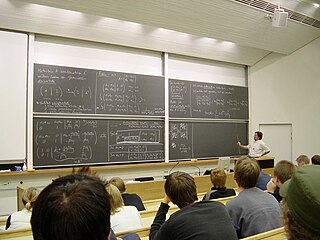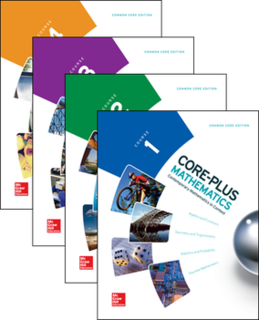
In contemporary education, mathematics education is the practice of teaching and learning mathematics, along with the associated scholarly research.

In education, a curriculum is broadly defined as the totality of student experiences that occur in the educational process. The term often refers specifically to a planned sequence of instruction, or to a view of the student's experiences in terms of the educator's or school's instructional goals. In a 2003 study, Reys, Reys, Lapan, Holliday, and Wasman refer to curriculum as a set of learning goals articulated across grades that outline the intended mathematics content and process goals at particular points in time throughout the K–12 school program. Curriculum may incorporate the planned interaction of pupils with instructional content, materials, resources, and processes for evaluating the attainment of educational objectives. Curriculum is split into several categories: the explicit, the implicit, the excluded, and the extracurricular.
Principles and Standards for School Mathematics (PSSM) are guidelines produced by the National Council of Teachers of Mathematics (NCTM) in 2000, setting forth recommendations for mathematics educators. They form a national vision for preschool through twelfth grade mathematics education in the US and Canada. It is the primary model for standards-based mathematics.
Founded in 1920, The National Council of Teachers of Mathematics (NCTM) is the world's largest mathematics education organization.
Dr. Timothy D. Kanold is a mathematics educator and author of textbooks. He was the president of the National Council of Supervisors of Mathematics (NCSM) from 2008 to 2009.
Saxon math, developed by John Saxon, is a teaching method for incremental learning of mathematics. It involves teaching a new mathematical concept every day and constantly reviewing old concepts. Early editions were deprecated for providing very few opportunities to practice the new material before plunging into a review of all previous material. Newer editions typically split the day's work evenly between practicing the new material and reviewing old material. Its primary strength is in a steady review of all previous material, which is especially important to students who struggle with retaining the math they previously learned. However, it has sometimes been criticized for its heavy emphasis on rote rather than conceptual learning.

Core-Plus Mathematics is a high school mathematics program consisting of a four-year series of print and digital student textbooks and supporting materials for teachers, developed by the Core-Plus Mathematics Project (CPMP) at Western Michigan University, with funding from the National Science Foundation. Development of the program started in 1992. The first edition, entitled Contemporary Mathematics in Context: A Unified Approach, was completed in 1995. The third edition, entitled Core-Plus Mathematics: Contemporary Mathematics in Context, was published by McGraw-Hill Education in 2015.
Mathematically Correct was a U.S.-based website created by educators, parents, mathematicians, and scientists who were concerned about the direction of reform mathematics curricula based on NCTM standards. Created in 1997, it was a frequently cited website in the so-called Math wars, and was actively updated until 2003. The website went offline sometime in late 2012 or early 2013 but has been preserved on the Internet Archive.
Traditional mathematics was the predominant method of mathematics education in the United States in the early-to-mid 20th century. This contrasts with non-traditional approaches to math education. Traditional mathematics education has been challenged by several reform movements over the last several decades, notably new math, a now largely abandoned and discredited set of alternative methods, and most recently reform or standards-based mathematics based on NCTM standards, which is federally supported and has been widely adopted, but subject to ongoing criticism.
Investigations in Numbers, Data, and Space is a K–5 mathematics curriculum, developed at TERC in Cambridge, Massachusetts, United States. The curriculum is often referred to as Investigations or simply TERC. Patterned after the NCTM standards for mathematics, it is among the most widely used of the new reform mathematics curricula. As opposed to referring to textbooks and having teachers impose methods for solving arithmetic problems, the TERC program uses a constructivist approach that encourages students to develop their own understanding of mathematics. The curriculum underwent a major revision in 2005–2007.
Math wars is the debate over modern mathematics education, textbooks and curricula in the United States that was triggered by the publication in 1989 of the Curriculum and Evaluation Standards for School Mathematics by the National Council of Teachers of Mathematics (NCTM) and subsequent development and widespread adoption of a new generation of mathematics curricula inspired by these standards.
Singapore math is a teaching method based on Singapore Ministry of Education national primary mathematics curriculum used for grade one through sixth grade in Singapore schools. The term was coined in the United States to describe an approach originally developed in Singapore to teach students to learn and master fewer mathematical concepts at greater detail as well as having them learn these concepts using a three-stage learning process: concrete, pictorial, and abstract. In the concrete stage, students engage in hands-on learning experiences using physical objects which can be everyday items such as paper clips, toy blocks or math manipulates such as counting bears, link cubes and fraction discs. This is followed by drawing pictorial representations of mathematical concepts. Students then solve mathematical problems in an abstract way by using numbers and symbols.
Connected Mathematics is a comprehensive mathematics program intended for U.S. students in grades 6-8. The curriculum design, text materials for students, and supporting resources for teachers were created and have been progressively refined by the Connected Mathematics Project (CMP) at Michigan State University with advice and contributions from many mathematics teachers, curriculum developers, mathematicians, and mathematics education researchers.
Reform mathematics is an approach to mathematics education, particularly in North America. It is based on principles explained in 1989 by the National Council of Teachers of Mathematics (NCTM). The NCTM document, Curriculum and Evaluation Standards for School Mathematics, attempted to set forth a vision for K-12 mathematics education in the United States and Canada. Their recommendations were adopted by many education agencies, from local to federal levels through the 1990s. In 2000, NCTM revised its standards with the publication of Principles and Standards for School Mathematics (PSSM). Like the first publication, these updated standards have continued to serve as the basis for many states' mathematics standards, and for many federally funded textbook projects. The first standards gave a strong call for a de-emphasis on manual arithmetic in favor of students' discovering their own knowledge and conceptual thinking. The PSSM has taken a more balanced view, but still emphasizes conceptual thinking and problem solving.

Roland "Ron" Edwin Larson is a professor of mathematics at Penn State Erie, The Behrend College, Pennsylvania. He is best known for being the author of a series of widely used mathematics textbooks ranging from middle school through the second year of college.

The Arkansas Department of Education (ADE), headquartered in Little Rock, is the state education agency of Arkansas for public schools. Founded in 1931, its responsibilities include accrediting schools, assisting Arkansas schools and their school districts in developing their curricula, approving the textbooks used in state public schools, licensing teachers, and providing continuing education programs. The ADE consists of five divisions: Division of Academic Accountability, Division of Fiscal and Administrative Services, Division of Human Resources, Division of Learning Services, and Division of Research and Technology.
From kindergarten through high school, the mathematics education in public schools in the United States has historically varied widely from state to state, and often even varies considerably within individual states. With the recent adoption of the Common Core Standards by 45 states, mathematics content across the country is moving into closer agreement for each grade level.
The Common Core State Standards Initiative is an educational initiative from 2010 that details what K–12 students throughout the United States should know in English language arts and mathematics at the conclusion of each school grade. The initiative is sponsored by the following organizations:
Sokikom (so-kee-kom) is the only collaborative math program where elementary students help each other learn through a team-based game. Based in San Jose, CA, Sokikom was founded in 2008 by Snehal Patel.
Sybilla Beckmann is a 2011 Josiah Meigs Distinguished Teaching Professor of Mathematics at the University of Georgia and is a previous recipient of the Association for Women in Mathematics Louise Hay Award.




